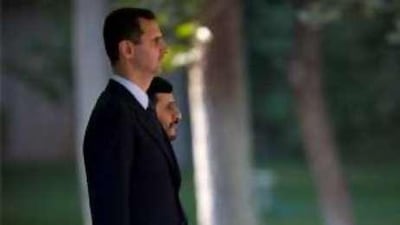Seven detained leaders of Iran's outlawed Baha'i community have confessed to establishing an illegal organisation that took orders from Israel and others to undermine Iran's Islamic system, a hardline daily newspaper in Tehran claims. The allegations will raise fears that Iran's persecuted Baha'is could be made to suffer even more as tensions increase between Israel and the Islamic republic over Tehran's nuclear programme.
Iran's Baha'is have frequently been accused of spying for other countries, in particular for Israel. The pacifist faith originated in Iran but has its headquarters in Haifa, opening it to particular suspicion in the eyes of Iranian officials. After a period during which hopes rose for a diplomatic solution to the nuclear crisis, military tensions are again rising. Tehran has ignored an informal two-week deadline to respond to an international package of incentives in return for suspending its uranium enrichment programme.
On Saturday, when the deadline expired, Mahmoud Ahmadinejad, the Iranian president, declared that Iran would not "give an inch on its nuclear rights", although he insisted yesterday that Tehran was serious about talks to find a "practical" solution to the stand-off. Israel's deputy prime minister warned on Friday that Iran was near a "major breakthrough" in its nuclear programme that posed an "unacceptable" danger to the Jewish state. Shaul Mofaz, a front-runner to succeed Ehud Olmert as Israeli prime minister this year, claimed Iran could be capable of producing uranium for military use by 2010. "We have to make sure we are prepared for every option. All options are on the table," he said. When the seven Baha'is were arrested this year, an Iranian official announced: "This is a group that has acted against the country's interests and has links with foreigners, especially Zionists." Officials claimed the seven were being held for security reasons and not because of their religious beliefs - an assertion rejected by Baha'i leaders.
Iran's daily Resalat went further yesterday, alleging the seven, who have been held incommunicado, had "set up an illegal organisation with connections to a number of countries including Israel, and they have received orders from them to undertake measures against the Islamic system". An official in charge of security affairs at Tehran's revolutionary court, named only as Mr Haddad, claimed that the seven had confessed.
A Baha'i official robustly rejected the allegations. "We see this as another trumped up charge against the Baha'is in order for the government to go through the motions of setting them up on charges and convicting them on charges," Douglas Moore, the director of the Baha'is Office of Public Information, told Israel Radio. The Baha'i International Community has said the seven were members of a committee that tends to the needs of Iran's Baha'is. Six, including one woman, were detained in May, and the seventh in March.
Shortly after the arrests, the european Union called on Iran to release the seven and "end the persecution of the Baha'i community". Human rights activists said oppression of Baha'is has increased since Mr Ahmadinejad came to power three years ago. The Iranian authorities recently announced the establishment of a "public information website" to combat the beliefs of the "deviant Baha'i cult". It would not be the first time that Iran has been accused of exploiting members of a religious minority for political reasons. In 1999, charges of spying for Israel were brought against 13 Jews in Shiraz and Isfahan, igniting international outrage. Ten of those charged were handed sentences ranging from four to 13 years in prison, although the penalties were later shortened. The last five detained were released in 2003.
Iran's 300,000 Baha'is are far more vulnerable than the country's much smaller Jewish community whose rights, like those of Christians, are protected by Iran's constitution because they are considered "People of the Book". Baha'is are not a recognised minority in Iran whose Shia Muslim establishment regards the religion as a heretical offshoot of Islam. The Baha'i faith was founded in the mid-19th century by Baha'u'llah, a Persian nobleman. His followers regarded him as the latest in a succession of prophets, including Abraham, Moses, Buddha, Jesus and Mohammed, serving the same God.
Baha'is stress the unity of humanity and world religions and say their mission is to bring peace in the world. Their faith calls for full equality between the sexes and an end to extremes of poverty and wealth. The British-Iranian comedian Omid Djalili, a Baha'i, has described the pacifist faith as "a sort of cuddly and sweet religion". Yet Baha'is have suffered bouts of persecution in Iran throughout their history. Oppression became official government policy in 1979 with the establishment of the Islamic Republic, which banned the religion.
The Baha'i International Community says since then more than 200 Baha'is have been executed or killed, hundreds more have been imprisoned and tens of thousands have been deprived of jobs, pensions, businesses and educational opportunities. "In the face of intense international pressure, the Iranian government gradually halted executions and greatly reduced the number of Baha'is held in prison," says the Baha'i International Community's website (www.Baha'i.org).
"Yet the wholesale persecution and oppression of Iranian Baha'is continues, though in a manner that seems designed to evade the scrutiny of international human rights monitors." The Iranian government denies that it has detained or executed people based on their religion. @Email:mtheodoulou@thenational.ae

